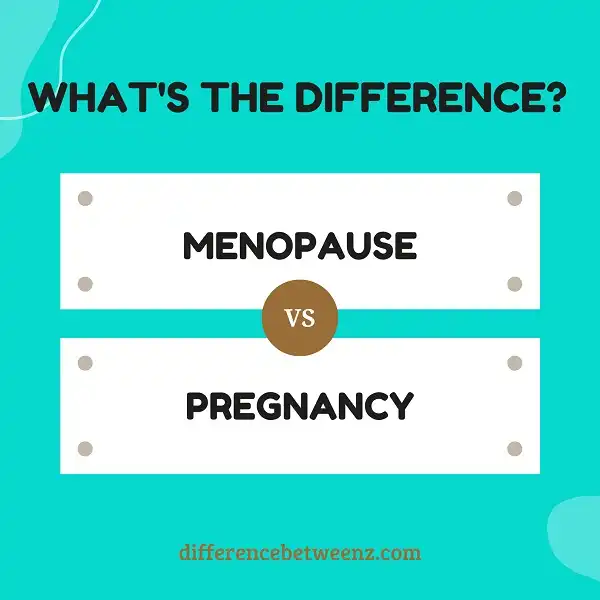It’s important to understand the difference between menopause and pregnancy, as the symptoms of each can be quite different. Menopause is a natural phenomenon that occurs when a woman’s ovaries stop releasing eggs, typically around age 51. Pregnancy, on the other hand, is a result of conception and involves the growth and development of a fetus inside the uterus. While both menopause and pregnancy can cause various physical changes in a woman’s body, the symptoms tend to be more severe during pregnancy. For example, pregnant women may experience nausea, fatigue, and mood swings, while women going through menopause may experience hot flashes and night sweats.
What is Menopause?
Menopause is the permanent end of menstruation and fertility, defined as occurring 12 months after your last period. It’s the result of a natural decrease in ovarian function and hormone production. As menopause approaches, your ovaries produce less estrogen and progesterone — hormones that regulate menstruation — and menstrual periods become irregular until they eventually stop altogether. In the United States, the average age for women to reach menopause is 51.
Menopause symptoms include hot flashes, sleep problems, vaginal dryness, mood changes, weight gain, and decreased sex drive. Menopause isn’t a disease or a disorder. However, it can cause significant physical and emotional changes that can disrupt your life. There are treatments available to help relieve menopause symptoms. You can also make lifestyle changes to help lessen menopause symptoms and reduce your risk of health problems associated with menopause.
What is Pregnancy?
- Pregnancy is the process by which a baby develops inside a woman’s uterus. It typically lasts for about 40 weeks, or 9 months, from the moment of ovulation (when the egg is released from the ovary) to the moment of birth.
- During pregnancy, the baby grows and develops inside the womb, receiving oxygen and nutrients from the mother through the placenta. The placenta is a organ that connects the baby to the uterine wall, allowing for exchange of oxygen and nutrients. As the baby grows, it puts pressure on the woman’s organs and muscles, which can cause fatigue, back pain, and other symptoms.
- Pregnancy can be a time of great joy, but it can also be a time of significant stress and anxiety. There are many things to think about during pregnancy, including prenatal care, nutrition, exercise, and labor and delivery. Pregnancy is an amazing process that results in new life. It is a time of great change for both the mother and the baby.
Difference between Menopause and Pregnancy
Though both menopause and pregnancy are major life changes that can cause significant physical and emotional upheaval, there are some key differences between the two experiences.
- For starters, menopause is a natural process that occurs when a woman’s body stops producing eggs, while pregnancy happens when a fertilized egg implants in the uterus. This means that menopause is not caused by an outside force, while pregnancy is.
- Additionally, menopause is typically a gradual process that begins around age 50 and can last for several years, while pregnancy generally lasts around 40 weeks.
Finally, while menopause marks the end of a woman’s reproductive years, pregnancy represents the beginning of them. Thus, though both menopause and pregnancy can be challenging transitions, they are ultimately quite different experiences.
Conclusion
There are many similarities between menopause and pregnancy, but there are also some key differences. Both transitions involve fluctuating hormone levels, but the symptoms and experiences of each vary greatly. Let’s take a closer look at these two life stages to see how they differ.
During menopause, estrogen levels decrease and this can lead to a wide variety of symptoms like hot flashes, night sweats, mood swings, and difficulty sleeping. For pregnant women, on the other hand, estrogen levels increase as the body prepares for labor and delivery. Pregnancy also brings its own unique set of symptoms like morning sickness, fatigue, and swollen ankles.


